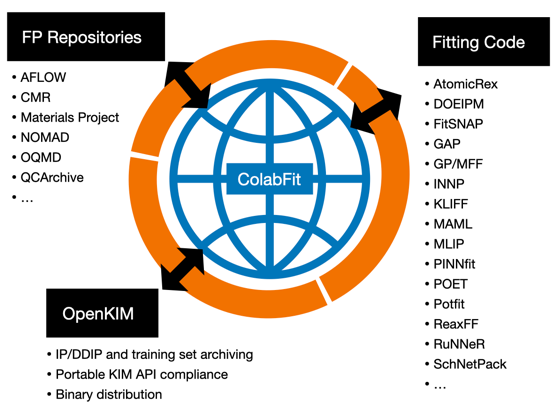Collaborative UMN research team awarded $1.13 million from NSF

A collaborative research team from the University of Minnesota, including Professor Ellad Tadmor and Professor Ryan S. Elliott from the Department of Aerospace Engineering & Mechanics and Chemical Engineering & Materials Science Assistant Professor Stefano Martiniani, was awarded a $1.13 million from the National Science Foundation (NSF) for their project " ColabFit: Collaborative Development of Data-Driven Interatomic Potentials for Predictive Molecular Simulations." ColabFit is a project aimed at enabling the rapid development and sharing of data-driven interatomic potentials (DDIPs) for molecular simulations based on advanced machine learning approaches.
This project aims to create a computational framework “ColabFit” that enables researchers to rapidly develop and deploy DDIPs for complex material systems by connecting existing cyberinfrastructure resources of first principles and experimental data with a variety of fitting frameworks. Building on an interoperable standard for machine learning models, researchers using ColabFit will be able to archive their state-of-the-art DDIPs and training sets to the Open Knowledgebase of Interatomic Models (OpenKIM), and retrieve existing ones to continue their collaborative development within a supported fitting framework of their choosing. Integration with OpenKIM will ensure that any DDIP created with ColabFit can be immediately used in multiple major simulation packages. ColabFit will be developed in collaboration with an international consortium of leaders in DDIP development, high-throughput first principles computation cyberinfrastructures, and materials standards organizations. The project will be tested on a target application of DDIP development for phase transformations in 2D transition metal dichalcogenides.
This project addresses a pressing need of the molecular simulation community. The creation of ColabFit will provide materials researchers with a powerful new ability to efficiently synthesize all available data and knowledge related to their particular problem of study. DDIPs developed through ColabFit and shared through OpenKIM will be archived with full provenance and version control and a persistent digital object identifier (DOI) to enable reproducible science and R&D, and be available to other researchers in the community to build upon by extending them for their own needs. Thus, major inefficiencies in today’s materials research industry will be eliminated and all of society can benefit from the resulting increase in scientific advancement.
ColabFit is a natural progression of the KIM project that Professor Tadmor and Professor Elliott have led for the past 10 years. OpenKIM is aimed at improving the quality of interatomic models used in molecular simulations, and as such, the emergence of DDIP technology is of central interest to the project. In particular, Tadmor’s group has recently been working on the development of DDIPs for 2D materials and on assessing the uncertainty in their predictions. This is critical since machine learning models lack a physical basis and can therefore have large errors when evaluated too far from their training sets. A paper describing a novel approach for assessing uncertainty based on dropout regularization has recently been published in npj Computational Materials (Nature affiliated). In addition, advanced software engineering techniques introduced by Elliott in the development of the KIM application programming interface (API) standard will play a central role in enabling DDIP portability and exchange.The ColabFit project naturally combines these efforts in the development of machine learning models, advanced software and engineering, and the KIM project. ColabFit will engage students, postdocs, and research scientists involved in the KIM project. Please email tadmor@umn.edu or visit the ColabFit website for more information on how to join the project.
